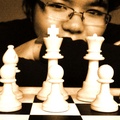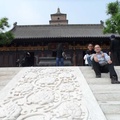Part 1 >>
VICTOR: About poetry… at one point you commented on poetry. How do you conceive it? What do you see in him? Many times I have tried to understand it and write it, read it in length but I achieved nothing until after reading something by Watanabe but it didn't go any further.
I think it is something that would help many people find meaning in their lives by seeing them through different eyes, but it is very distant when the culture is poor.
PATY: For me poetry is beauty.
I like this phrase in particular, I think it's from Antonio Cisneros: "People often say 'I wanted to say that too, but I didn't know how'. Poetry is in how."
At first I used it (poetry) as a means to say those things that I could not or did not know how to express in other ways. Most begin by writing about love, you know, because of the theme of adolescence and first falling in love, but the funny thing is that in my case it was not like that, since I started writing feelings like anger, disappointment, pain, or emotions such as anxiety, anguish; that is, it appeared as a means of catharsis. That is why my first favorite author, the one with whom I most identified, was not Bécker or Neruda, it was Vallejo, then Rimbaud caught my attention.
But that whole stage evolved over time and today I don't find myself writing that type of poetry, on the contrary, now my perspective is much more positive, happier, more optimistic. I think that's why I write less now hehe.
How do I conceive poetry? I continue to see it, one, as a means of expression, something that comes inherently from its concept of art, and two, as a resource to create beauty. Every time I sit down to write something, I try to produce in me the same thing I feel when listening to a beautiful melody, for example. The sensation of creating beauty must be something as similar to the sensation of entering the tube of a wave, for surfers (sorry surfers, hehe)
And look, you are a visual artist and you don't understand much about poetry. I write poems but I don't understand much about visual art, I think it's part of the predisposition.
I will tell you that there is certain poetry that I don't understand, but I think that there is the magical side of art, in the mystery, in the "I don't know what." In my case, I confess that I like to write "without difficult words that you cannot understand" (as Eduardo Chirinos would say), nor do I like to make an effort to make rhymes or figures.
For example, you mentioned Watanabe, I never understood him, yet he is considered one of the best Peruvian poets. It seems complicated to me. I like better, however, another Nikkei poet, Percy Taira. I feel his poems are simpler, fresher, lighter. But in the end, whether you like it or not, whether you understand it or not, I think it has to do with each person's surrealism.
VICTOR: My first poem was about a Cough (and there wasn't a second). I don't remember the previous attempts, I didn't keep them because they were very bad.
From Watanabe, he is the first poet that I read carefully and, it may be because of the understanding I have today, much superior to when I tried to read poetry as a teenager, I was impressed by his level of abstraction in such a simple communication... therein lies the beauty that you mention.
From Percy Taira, I read some of Puerta Azul and Logbook. It seems mundane to me (without being pejorative), very immediate such that it does not let the images enter the heart... it remains in reason appealing to the materiality of our existences. Maybe that's why it's easier to understand than Watanabe...
The interesting thing about poetry is that it can take us out of this reality, like a movie or play, but without the need to move, to buy something, to “be” somewhere. It is better not to be there to enjoy it.
Do you think many young people read poetry or only read blogs? Because they don't even dare to open a book.
PATY: Hahaha I'm dying to read the cough poem!
And I agree with you, poetry sometimes behaves like a kind of teleporting vehicle, and it is one of the cheapest ones, because you only use a sheet and a piece of paper. On the other hand, something that I like in particular is that it (poetry) has no limits or forms, to begin with I have not seen something like a "school of poets", I think its beauty also lies in that spontaneity and variability.
As if to illustrate this, I'm going to transcribe something I read somewhere, it was titled "a paragraph":
I thought about writing a paragraph
any
in prose
as usual
after
remove punctuation marks
cut it as if it were verses
and get like this
a poem
but it seems to me that
Yes, I do
it's cheating
It makes me laugh. Well, now touching on the question, I think so, and I also tell you this as a personal case. It is much cheaper to read poetry on the Internet than to buy a book, it is clear that on the Internet you do not find "scoops" but nowadays there are also several poets who publish their works in e-book format, and it is something.
There is a very small group of people for whom spending a lot of time on computers affects their eyesight, I have a couple of friends who complain about it, but in general I think that today's generation prefers reading blogs than reading poetry, in the sense which is more interactive.
And read books? I think it has always been a problem, of course it was minor before, but today it has become more acute with the appearance of video games, network games, mp4s, etc. Of course, in some of these cases you develop skills, but others do nothing other than numb your brain, like spending a lot of time in front of the TV, for example.
And I'm talking like a good person when at the end of the day I'm in the same situation! haha, I also find it difficult to open a book, and the few times I have done so it has been either out of obligation or by recommendation. Of course, it shouldn't be like that. But I trust that you can pick up the habit at any time, as long as you make up your mind.
Of course, I am one of the people who think that in the future there will no longer be books, records, DVDs, or anything like that: Everything will be virtually.
VICTOR: So poetry is like graffiti?
The virtual world has its advantages and disadvantages like everything. It is another way of approaching matter and society, nothing more; It is another instrument to experience Life.
But the truth is that in “virtuality” there are still human evils such as the cowardice of anonymity and the ease of judgment against those who think differently.
PATY: Poetry like graffiti? Clear! It may be, but in the sense that it is accessible, that it can reach everyone, something that does not happen, for example, with theater.
And I support you, the virtual medium lends itself to several negative things, among them the cowardice of anonymity as you point out, and also the piracy of ideas.
But it's like everything, I guess, there will always be pros and cons. However, there is something that seems inevitable: Every day we are approaching a more virtual, more intangible world.
Thank you very much for your time, Paty, it was a curious and fun conversation. Best wishes for your entire life.
© 2012 Victor Nishio Yasuoka












